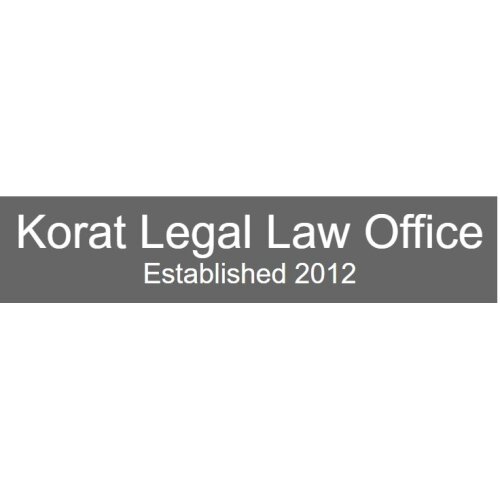Best Mortgage Lawyers in Nakhon Ratchasima
Share your needs with us, get contacted by law firms.
Free. Takes 2 min.
Free Guide to Hiring a Real Estate Lawyer
List of the best lawyers in Nakhon Ratchasima, Thailand
About Mortgage Law in Nakhon Ratchasima, Thailand
Mortgage law in Nakhon Ratchasima, like the rest of Thailand, primarily deals with legal concerns related to real estate and property loans. Mortgages in Thailand are governed by the Civil and Commercial Code, which outlines the rights and responsibilities of lenders and borrowers. In Nakhon Ratchasima, known for its growing property market, understanding these laws can help both locals and expatriates secure property while ensuring their investments are legally protected. The city offers a blend of residential and commercial opportunities, making it pivotal to be informed about the legal frameworks governing mortgages and property finance.
Why You May Need a Lawyer
Securing a mortgage involves navigating complex legal procedures, especially in a foreign country. In Nakhon Ratchasima, you may need a lawyer to ensure that all transactions comply with Thai law. Common situations requiring legal assistance include:
- Interpreting and negotiating mortgage terms with banks or lenders.
- Ensuring property title deeds are clear and free of encumbrances.
- Resolving disputes over property boundaries or loan agreements.
- Navigating the process of foreclosure or loan default.
- Handling the legalities involved in transferring property ownership.
A lawyer can provide invaluable guidance in these scenarios, safeguarding your interests and ensuring a smooth transaction process.
Local Laws Overview
Several key aspects of local laws in Nakhon Ratchasima are crucial for understanding mortgages:
- Registration Requirements: Mortgages must be registered at the local Land Department to be legally binding.
- Foreign Ownership Restrictions: Non-Thais generally cannot own land but can have leasehold rights or own condominiums under specific conditions.
- Interest Rate Regulations: Thai laws place ceilings on the interest rates that can be charged to protect borrowers from usurious practices.
- Foreclosure Procedures: In case of default, lenders can initiate foreclosure, but the process involves court proceedings to ensure due process.
Familiarity with these laws helps protect your investment and ensures compliance with Thai legal standards.
Frequently Asked Questions
What is the typical process for applying for a mortgage in Nakhon Ratchasima?
To apply for a mortgage, you typically submit financial documents to a Thai bank, undergo a credit evaluation, and agree to loan terms before registration with the Land Department.
Can foreigners obtain mortgages in Nakhon Ratchasima?
While foreigners face restrictions in owning land, they can obtain mortgages for condominium purchases or leasehold agreements under specific conditions set by Thai banks.
What should I verify before finalizing a mortgage agreement?
Ensure the property's title deed is clear, understand all terms of the mortgage agreement, and verify the property's appraised value matches the loan amount.
What happens if I default on my mortgage payments?
Foreclosure processes can be initiated by the lender, involving court intervention and potential auction of the property to recover losses.
Is refinancing a mortgage possible in Nakhon Ratchasima?
Yes, refinancing is possible and involves negotiating new terms with the existing or a new lender, often to benefit from lower interest rates.
What legal documents are needed for a mortgage in Thailand?
Essential documents include the title deed (Chanote), loan agreement, personal identification, proof of income, and registration with the Land Department.
Can I negotiate mortgage terms with Thai lenders?
While some flexibility exists, banks often follow strict policies based on the borrower’s financial status and the property’s appraised value.
Are there any taxes or fees associated with mortgages in Thailand?
Expect to pay mortgage registration fees, transfer fees, and possibly a stamp duty, all of which vary based on property value and the loan amount.
How long does the mortgage approval process take?
Typically, it takes a few weeks to a couple of months, depending on the bank’s due diligence process and whether all necessary documents are in order.
What role does the Land Department play in mortgage transactions?
The Land Department registers mortgages and oversees title changes, ensuring all transactions comply with Thai property laws.
Additional Resources
To better understand mortgages in Nakhon Ratchasima, consider reaching out to these resources:
- The local Land Department office for title registration and property records.
- The Bank of Thailand for comprehensive banking regulation information.
- Expat-focused legal firms that specialize in Thai property law for personalized advice.
- Local real estate agencies offering guidance specific to the Nakhon Ratchasima market.
- The Thai Real Estate Act and the Civil and Commercial Code for legal details.
Next Steps
If you require legal assistance with a mortgage in Nakhon Ratchasima, it is advisable to:
- Contact a lawyer specializing in Thai real estate law for a consultation.
- Gather necessary documents like identification, income proof, and property details.
- Discuss your needs and concerns with your lawyer to formulate a plan of action.
- Engage with local financial institutions to understand mortgage options available.
- Consider additional legal advice if you encounter complex issues such as foreclosures or ownership disputes.
Taking these steps will help ensure that your mortgage process is legally sound and aligned with your financial goals.
Lawzana helps you find the best lawyers and law firms in Nakhon Ratchasima through a curated and pre-screened list of qualified legal professionals. Our platform offers rankings and detailed profiles of attorneys and law firms, allowing you to compare based on practice areas, including Mortgage, experience, and client feedback.
Each profile includes a description of the firm's areas of practice, client reviews, team members and partners, year of establishment, spoken languages, office locations, contact information, social media presence, and any published articles or resources. Most firms on our platform speak English and are experienced in both local and international legal matters.
Get a quote from top-rated law firms in Nakhon Ratchasima, Thailand — quickly, securely, and without unnecessary hassle.
Disclaimer:
The information provided on this page is for general informational purposes only and does not constitute legal advice. While we strive to ensure the accuracy and relevance of the content, legal information may change over time, and interpretations of the law can vary. You should always consult with a qualified legal professional for advice specific to your situation.
We disclaim all liability for actions taken or not taken based on the content of this page. If you believe any information is incorrect or outdated, please contact us, and we will review and update it where appropriate.









